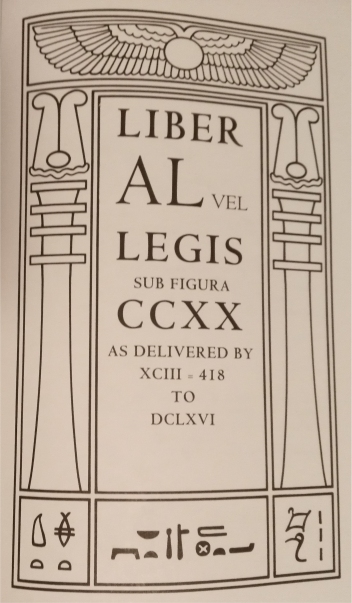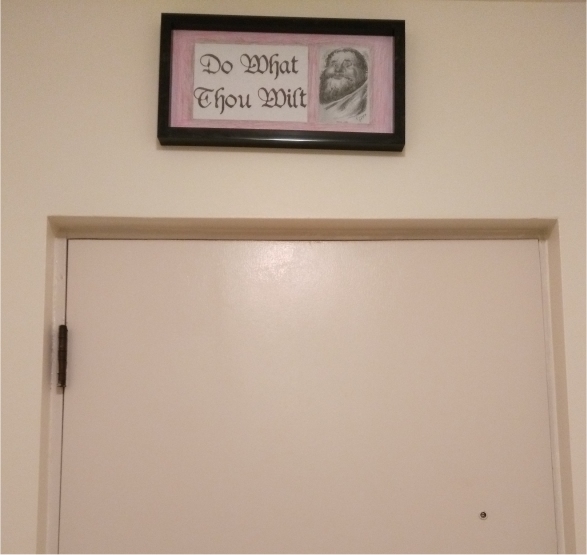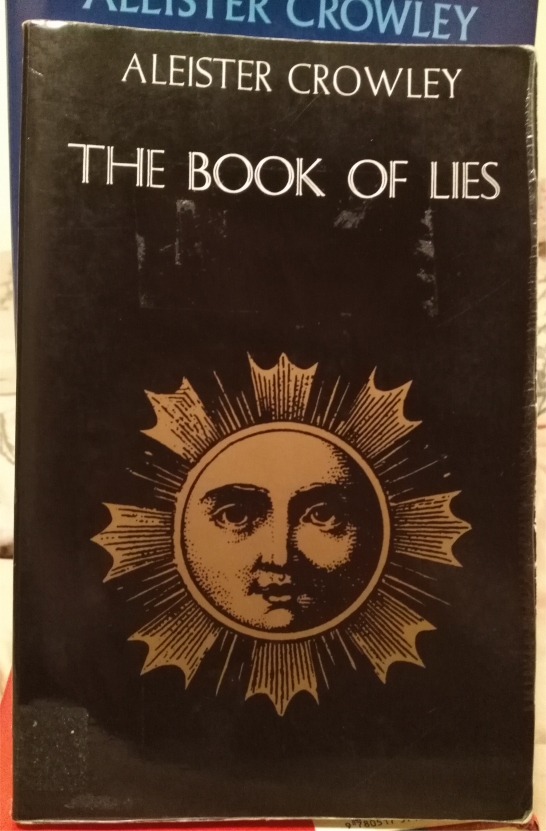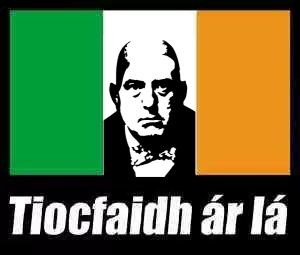I’ve written about Aleister Crowley’s books before, but of the texts I reviewed, one was a novel and the other a translation. I thought it high time to look at some of Crowley’s mystical texts, the ones in which he propounds his deepest insights into magick, humanity and existence. To start, I decided to look at what is perhaps his best known work, the Book of the Law.
Just to get this out in the open right away: I’m not an expert on Crowley, and this is mostly an opinion piece. If you are a dedicated Thelemite and you feel frustrated/offended by anything in this post, please leave a comment and explain to me where I have erred. I would genuinely be interested in your insight.

The text of the Book of the Law or Liber AL vel Legis (hereafter to be referred to as AL) was supposedly revealed to Aleister Crowley by a guardian angel styled spirit named Aiwass in 1904. The work is rather short (about 20 pages), but it provides the foundation for the religion of Thelema. Much of Aleister Crowley’s subsequent literary output either references this text or serves as a commentary on it. While not an expert by any means, I’ve been mildly interested in Aleister Crowley for a few years, and I’ve had an idea of the importance of this book to his followers ever since I read about it after buying my first Fields of the Nephilim cd. I decided to buy a copy of AL a few years ago, but then I found out that the text was included in its entirety in Crowley’s Liber ABA, Book 4, Magick, a much larger and more expensive book that, for some reason I have since forgotten, I was determined to own. I thus decided that I would wait until I owned a copy of Book 4 before reading the Book of the Law. In the meantime, I found myself in possession of a book called Portable Darkness. This is a collection of assorted writings by Crowley that also includes the text of the Book of Law, but it doesn’t contain the infamous Comment section. I hate abridgments and so decided not to read AL until I owned the complete text. Eventually I found an affordable copy of Book 4, but when I opened it up and realized that it was largely about yoga, I felt desperately ashamed of myself and put it on the shelf to collect dust for few years.
I decided to read AL a few months ago, but I wanted to do a bit of research on it beforehand to ensure a decent level of understanding. I read essays about it in Portable Darkness and DisInformation’s Book of Lies and on countless websites. I listened to youtube clips of Robert Anton Wilson’s ramblings on Crowley, and I even read the wikipedia pages of the Egyptian deities that I knew were going to be alluded to in the Book of the Law. I felt fairly prepared by the time I opened the book.
Jesus Christ lads, what a pile of muck.
Honestly, I don’t even know where to start with this garbage. I’ve long understood that Aleister Crowley was both full of shit and had his head up his arse, and I wasn’t really surprised that he had the audacity to present this hogwash as divine revelation, but I was a little taken aback by extent to which he has gotten away with it. I could break the text down and analyze it piece by piece, but it doesn’t merit doing that. With the amount of time and effort it would take to squeeze any form of meaningful interpretation out of this barrel of masturbatory vomit, a person could doubtlessly resolve several of their real life problems. Thelemites, I have deduced, are just religious hipsters. Their religion is far more obscure than yours; I mean, you’ve probably never even heard of it, and you almost definitely wouldn’t get it if you did. Other tortuous religious texts have the excuse that they were written thousands of years ago by individuals living in societies that were vastly different our own. The Book of the Law, on the other hand, was written by a smackhead British toff that wanted to make himself sound mysterious and smart so that he could get girls (and a few fellas) to sleep with him. If you’ve been thinking about reading this piece of trash, take my advice: spend that time updating your CV and applying for a new job instead.
 Now, if you are ever lucky enough to be in my apartment, you might notice the above sign. Why would a person who has such disdain for Crowley’s masterpiece place its credo above his front door? Well, the phrase ‘Do what thou wilt’ and the word ‘Thelema’ actually come from one of my favourite books, the novel Gargantua and Pantagruel by François Rabelais. In this long and lurid tale, the Abbey of Thélème is basically a monastery, led by the licentious Friar John (pictured above), where the only rule that the brothers must follow is ‘Do what thou wilt’. This phrase was later adopted as a motto for the Hellfire Clubs. Interestingly enough, it’s also word-for-word the advice given by Mephistopheles to Faustus after he has turned the good Doctor invisible inside the chambers of the pope in the 7th scene of Marlowe’s tragedy (A-text).
Now, if you are ever lucky enough to be in my apartment, you might notice the above sign. Why would a person who has such disdain for Crowley’s masterpiece place its credo above his front door? Well, the phrase ‘Do what thou wilt’ and the word ‘Thelema’ actually come from one of my favourite books, the novel Gargantua and Pantagruel by François Rabelais. In this long and lurid tale, the Abbey of Thélème is basically a monastery, led by the licentious Friar John (pictured above), where the only rule that the brothers must follow is ‘Do what thou wilt’. This phrase was later adopted as a motto for the Hellfire Clubs. Interestingly enough, it’s also word-for-word the advice given by Mephistopheles to Faustus after he has turned the good Doctor invisible inside the chambers of the pope in the 7th scene of Marlowe’s tragedy (A-text).

I also read The Book of Lies. This book is probably slightly more self indulgent than the Book of the Law, but it’s made a little more palatable by the fact that it comes across as being more aware of its own absurdity. (I’m not saying that Crowley wasn’t aware of how obnoxious the Book of the Law seems; he might well have written it just to wind people up.) The Book of Lies, or to give it its full title, The Book of Lies,Which is also Falsely Called BREAKS. The Wanderings or Falsifications of the One Thought of Frater Perdurabo, which Thought is itself Untrue. Liber CCCXXXIII [Book 333], is broken up into 91 little passages that can be read as poems, jokes, philosophical aphorisms, nuggets of advice, magickal instructions and/or riddles. Each passage comes with a commentary from Aleister that’s supposed to explain it. Most of this book is absolute rubbish, but there were a few bits that made me think.
The 80th passage starts off:
“The price of existence is eternal warfare.
Speaking as an Irishman, I prefer to say: The price
of eternal warfare is existence.
And melancholy as existence is, the price is well
worth paying.
Is there is a Government? then I’m agin it! To Hell
with the bloody English!”
A self-professed Irishman? Wasn’t he born and raised in England? Crowley’s attitude towards Ireland was a little strange. He once wrote a rather curious poem to Saint Patrick, requesting that the saint come back to again rid the country of snakes (an apt metaphor for the brits). Within the O.T.O. Crowley obtained the title of Supreme and Holy King of Ireland, Iona and all the Britains within the Sanctuary of the Gnosis, and two years later, in 1914, he went to New York and tried to convince people that he was there to raise support for Irish independence. His attempts to do so included writing a declaration of independence for the Irish Republic. As with much of what he did, it is very hard to tell how sincere he was being, but he definitely seems to have been on the right side of the argument. The above chapter is a little cringey, but I like the idea of existence being the downside of chaos.

There’s another interesting bit in the commentary for chapter 46 where Aleister says,
“The lesson of the chapter is thus always to rise
hungry from a meal, always to violate one’s own nature.
Keep on acquiring a taste for what is naturally
repugnant; this is an unfailing source of pleasure”
There’s something wonderfully Sadean about this notion, and although seemingly paradoxical, it’s remarkably accurate. Humans get bored very easily, and we love doing what we shouldn’t. Hardcore pornography, death metal, super spicy food and ultraviolent films might seem rather unpleasant the first time they are encountered, but they all have the potential to become ‘unfailing sources of pleasure’. However, while I think that Crowley’s observation on the insatiability of human nature is interesting, I’m not sure that I agree with his advice. While our tendency may be to intensify our pleasures, I think it might be dangerous to make the intensification the goal. I’m not preaching humility here; I just reckon that there comes a point in most human endeavors where enough is enough.
There were a few other bits and pieces in here that made me think, but it probably wasn’t really worth reading the whole thing to find them. The most rewarding part of the book was probably when I finally got the Psalm 69 joke that Ministry used on their ΚΕΦΑΛΗΞΘ album. I’ve listened to that record a thousand times, and I have often wondered what the ‘the way to succeed and the way to suck eggs’ line meant. After reading the commentary here, I felt a bit silly for not getting it sooner. I guess I just never thought that Al Jourgensen would be smart enough to use puns. Chapter 88 (Gold Bricks) is pretty funny too. I’ll leave you to find it for yourself.
There you have it. Aleister Crowley led a very interesting life, but his books are shit. His magical writings serve as little more than ‘how to be Harry Potter’ instruction manuals for grown-ups who want to play make-believe (or is it believe-make?) In fairness to Crowley, I don’t think either the Book of the Law or the Book of Lies are aimed at beginners, but if understanding these works is what reading his other books will allow me to do, I’ll probably not be bothering.



Like a lot of people (I suspect), I’m into AC for the uniqueness of his bio and for his unexpected posthumous influence on the likes of Page, Ozzy, et al, rather than for his “philosophy.” Still, he was a true original, and even if a lot of his writings are self-indulgent gibberish there are some literary gems scattered here and there throughout – kind of like most religious texts, in fact. His “autohagiography,” “The Confessions,” is pretty entertaining, as when a relative warns young Al to avoid the two bad kings, “Smo-king” and “Drin-king,” and lil’ 666 reminds him of the third… What a character.
LikeLiked by 1 person
Yeah. I think it’s the fact that he seemed to know that he was full of shit that makes him tolerable enough to be interesting. I just got another book on him in the post too, so he’ll be discussed here again.
I can’t imagine Ozzy Osbourne having the patience to actually read Crowley. And let’s be honest; the song he wrote about him isn’t very good. Were there any Zeppelin songs about Crowley?
LikeLiked by 1 person
I believe Ozzy’s “Mr. Crowley” was mostly composed by the guys in his band at the time (Rhoads, Daisley, Kerslake, I believe), and that Mr. Osbourne just sang the words – although for my taste the song is a hard rock classic. Zeppelin never had a song directly referencing him, but Page certainly discussed his interest in interviews, along with owning Crowley’s Boleskine House for a period and inscribing “Do What Thou Wilt” on the runoff of the original pressings of LZIII. DWTW was also inscribed on invites to LZ’s launch of their Swan Song vanity label…And somewhere in Crowley’s Magick in Theory and Practice is a suggestion to do stuff backwards, including “listen to phonograph records reversed,” and we all know where that lead, or led. Looking forward to the next post. nataS teewS yM ot s’ereH.
LikeLike
Oh dear. If the Book of the Law is ‘hogwash,’ try ‘The Law is for All’ which explains it in plain English. The Book of the Law uses qabalistic codes, cyphers, metaphors etc which are bound to – even meant to – look nonsensical if you have no grounding in the subject. ‘The world of magick is a mirror, wherein he who sees mud is mud.’ As to the pejorative ‘smackhead,’ AC was prescribed heroin by his doctor to relieve the symptoms of severe asthma, which was both legal & common practice in those days. He could be and was an arse in many ways, but ‘smackhead’ is a bit unfair, esp given the agonies he went through trying to quit the damned stuff in later life.
Love your blog!
LikeLiked by 1 person
Just my opinion, but I reckon any text that requires its reader to read another book in order for it to be understand is a poor piece of literature. That kind of thing reeks of the writer’s sense of self importance.
I understand that the work is based on “qabalistic codes, cyphers, metaphors etc”, and that is precisely why I dislike it. That kind of elitism reminds me of bullshit academics who fill their papers with jargon and references and ultimately say nothing.
From what I can see, the worth of this work lies in the practice of deciphering its contents, not the contents themselves, and I’m sorry, but that kind of shit has no value to me.
As for calling a Crowley a smackhead; that’s not all that bad compared to the things I’ve called the heads of other religions!
LikeLike
But AL isn’t a ‘piece of literature’ in the way Far From the Madding Crowd is, and it doesn’t ‘require’ you to read another book to understand it,, that was just a suggestion of mine. The book itself states that it has different layers of meaning suited to different audiences. In that respect it’s no more self-important than a mathematical paper, which may be incomprehensible to the layman but profound to the specialist. To quote AC, ‘The fact that you don’t understand something does not necessarily mean it is nonsense; it may simply be that you don’t understand it.’ That’s not elitism, imo, it’s a call to expand one’s own knowledge. Otherwise we’d give up on all ‘difficult’ books and be left with Dan Brown. I’ll take Crowley -and Thomas Hardy- anyday.
Seriously, try The Law is for All. It’s well worth a read. Or at least track down Louis Wilkinson’s introduction.
And yes, the smackhead crack was pretty tame. At least you didn’t blame AC for sinking the Titanic!
LikeLiked by 1 person
You suggest the Law is for All, but Crowley himself wrote that. One may not need a companion text, but they are generally recommended.
Of course this is quite different to most novels, but is it all that different from something like Finnegan’s Wake, another text that is full of riddles, symbols and mumbo jumbo?
Finnegan’s Wake is absolute rubbish too, don’t get me wrong, but James Joyce never cheapened it by writing volumes to explain it. I reckon that’s part of the reason that Joyce is revered as a literary genius but Crowley is generally remembered as a weird devil worshipper.
Thanks for the comments by the way. I’m sure I come across as a bit of a dickhead, but please now that I am genuinely very interested in your take on this!
LikeLike
Oh, I’m a bit of a dickhead myself sometimes. No harm in that. Joyce I’ve yet to get around to, largely because of the difficult/nonsense view of him. Yet I still don’t see how you think an explicatory text by Joyce is ‘cheapening’ the original. Does A Brief History of Time cheapen the original work it was based on? Does Carl Sagan’s Cosmos cheapen cosmology? I don’t think so. You seem to have a thing against popular/simplified explanations of complex or difficult matters; but that surely that leaves complexity – scientific, mystical, literary – in the hands of the specialists, which is the very elitism you earlier expressed a distaste for. Joyce may well be rubbish, but to understand something and think it rubbish is one thing, to think something is rubbish because you MISunderstand it is another. Hence the need for popular editions for a non-specialist interested party to increase their understanding, in whatever field.
LikeLiked by 1 person
I have absolutely nothing against popular/simplified explanations of complex or difficult matters. It’s the audacity of the author who writes a book to explain his own book that bothers me. If the message of the book is expressible in simple terms, then, in my opinion, it should have been written in simple terms originally.
I don’t hold this standard for books of poetry, but as AL purports to be instructional or at least expository, I can see no reasons for its deliberate obscurantism other than giving magickal nerds the chance to pat themselves on the back because they get it. It is in that sense that I say that this text is elitist. As a mystical text, it is directed towards initiated occultists. A layman will be limited to reading it as poetry.
The word ‘misunderstood’ implies that I have misinterpreted the contents of the work. I may well have misjudged its value, but I didn’t think about it enough to misunderstand it.
Again, it’s not the fact that I don’t understand it that makes it rubbish; it’s the fact that it was written so that I wouldn’t understand it. Yeah, I could read more books to try to make sense of it, and I know that lots of people do, but personally, I would prefer to spend my time reading something a little juicier.
Like I said, I didn’t go into this as a complete beginner; I’ve read enough to understand the basic ideas of Crowley’s philosophy. I just have no desire to understand the finer points of his mysticism.
LikeLike
And that’s fine. The only real quibble here is that, of everything AC wrote, he was adamant to his dying day that he wasn’t the author of Liber AL, merely the ‘scribe’ who wrote it down. Aiwas was the real author. So technically his commentaries aren’t explaining his book, but Aiwass’ book. Here of course is the great stumbling block, whether you believe in ‘discarnate entities’ or not. I don’t, myself; and speculation on such matters goes beyond book criticism. But AC did believe in them, especially in regard to Liber AL. So I’d assess his commentaries with that in mind, just as I’d assess The Imitation of Christ as the work of someone who did believe in Christ, even though I don’t. I don’t need to believe it to find it good or useful or interesting. And again, ‘written so you wouldn’t understand it’ isn’t elitism, imo. You don’t understand parts of it because parts of it are in the ‘technical’ language of occultism. The fact that you don’t want to understand those parts is, as you’ve stated, YOUR choice not the author’s. To continue the scientific analogy, even a popular work of science, The Elegant Universe, say, resorts to the technical language of its subject because that language – equations etc – conveys ideas with a clarity and concision that plain English can’t manage. I don’t consider that elitism, just practicality.
On an unrelated note, it was finding your blog that prompted me to read Phil Baker’s biography of Dennis Wheatly. Hugely enjoyable.
LikeLike